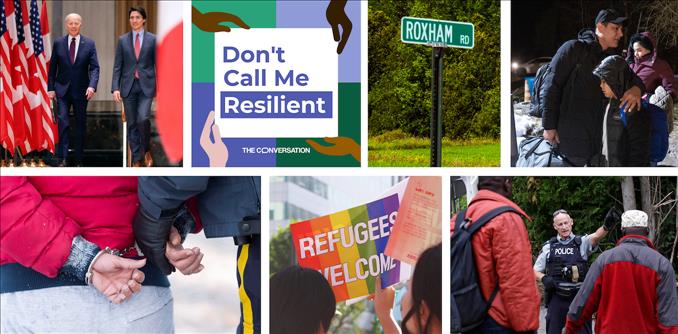(MENAFN- The Conversation) In this episode of don't call me resilient , migration expert Christina Clark-Kazak explains the devastating consequences of last week's meeting between United States President Joe Biden and Canadian Prime Minister Justin Trudeau. The meeting resulted in significant changes to a cross-border agreement and has already impacted the lives of thousands of asylum seekers attempting to make a life in Canada.
We explore what these changes will mean for those people searching for a safe home who are now being turned away from Canada. We also discuss the racialization of Canada's immigration policies.
Clark-Kazak, an associate professor in the School of Public and International Affairs at the University of Ottawa, urges Canadians to think critically about who we accept as refugees, and who we turn away. She said:
Claiming asylum in Canada
What the new amendment basically does is close any irregular border crossings for asylum seekers hoping to cross the U.S.-Canada border.
One of these irregular border crossings is at Roxham Road. Roxham Road is a rural road in upstate New York that crosses the border with the province of Québec. And last year, around 40,000 people arrived at this unofficial border crossing, hoping to find their way into new lives in canada.
To look at it by numbers, this new amendment to the irregular U.S.-Canada land crossing is in sharp contrast to Canada's limitless welcome to Ukrainian refugees (there is no cap set on the number of migrants from Ukraine to Canada). Last year, 130,000 Ukrainian refugees arrived in Canada by air and were given temporary status. In 2015-2016, Canada welcomed 25,000 syrians . Approximately 40,000 people crossed at Roxham Road in 2022.
Confusion and devastation at Roxham Road
Before the Safe Third Country Agreement, which was signed in 2002, shortly after the 9/11 terrorist attacks in the U.S., both countries could reject asylum seekers at official border crossings. But there was a small loophole that provided a slim window for people desperately looking for a way into Canada. People who crossed at unofficial border crossings could still claim asylum.
With this new amendment, that slim window gets even smaller. migrants can now be turned away at unofficial border crossings as well. The change took effect suddenly on Saturday, causing all kinds of confusion and trauma.
But issues at play at Roxham Road are larger than any one single border crossing. They are intimately connected to global politics including economic inequities, resource extraction, imperialism, colonialism and exploitation.
For many people, turning back is not an option. As Clark-Kazak said:
Even with changes to the Safe Third Country Agreement, this journey is a risk that thousands will continue to take.
Image credit: Ryan Remiorz/The Canadian Press. Listen and Follow
You can listen to or follow Don't Call Me Resilient on apple podcasts , google podcasts , spotify or wherever you listen to your favourite podcasts . we'd love to hear from you , including any ideas for future episodes. Join The Conversation on twitter , facebook , instagram and tiktok and use #DontCallMeResilient.
In The Conversation
3 ways ottawa can rebuild trust following changes to the safe third country agreement by Christina Clark-Kazak
Read more: justin trudeau and joe biden are missing the bigger picture about migrant border crossings
Read more: the u.s. is playing border politics again - this time with canada
Read more: refugee stories reveal anxieties about the canada-u.s. border
Read more: refugee stories reveal anxieties about the canada-u.s. border
Transcript
unedited transcript of this episode
Read more
u.s.-canada migration deal aims to end walk-around crossings
government of canada: asylum claims by year (2022)
ukraine immigration measures: key figures
ethical considerations: research with people in situations of forced migration
canadian council for refugees
Don't Call Me Resilient is produced in partnership with the Journalism Innovation Lab at the University of British Columbia and with a grant from the Social Sciences and Humanities Research Council of Canada.
























Comments
No comment